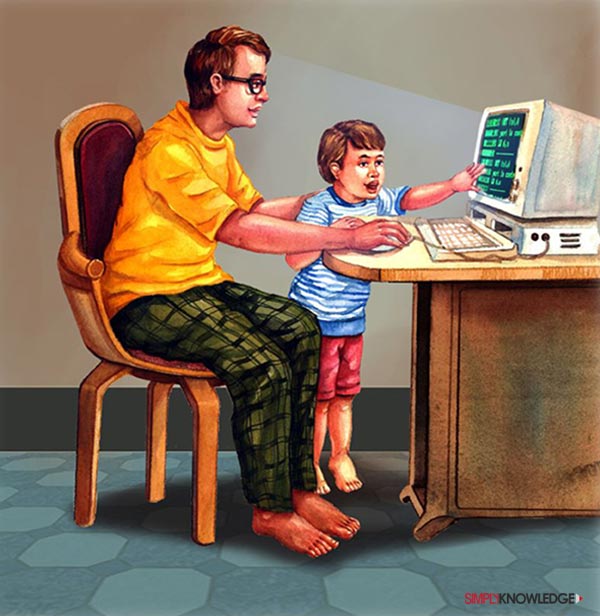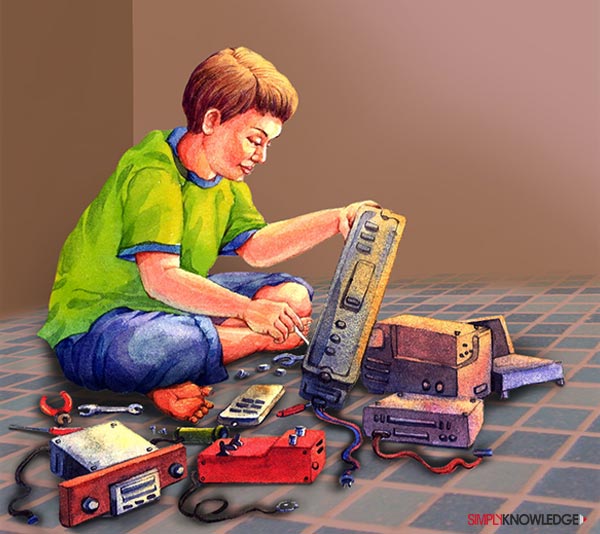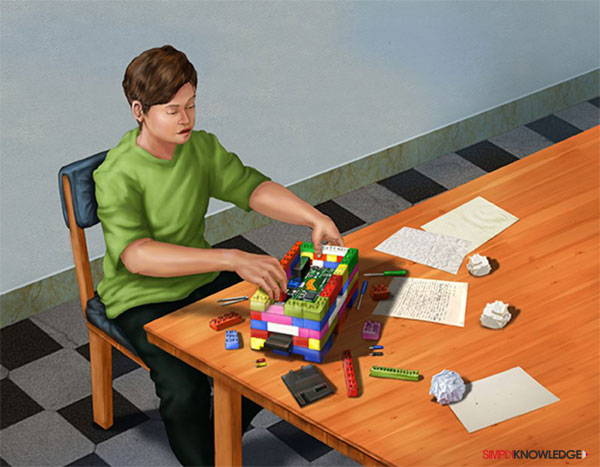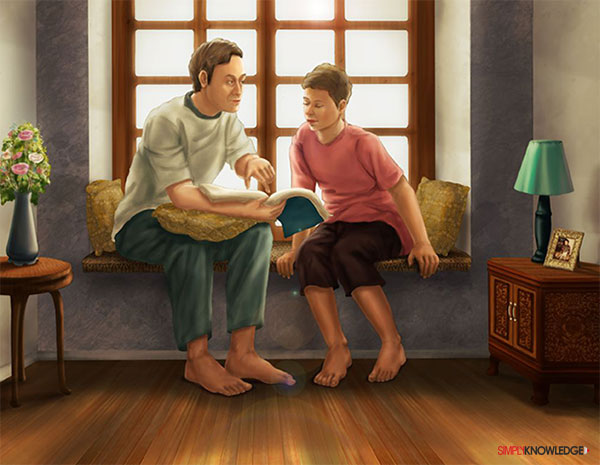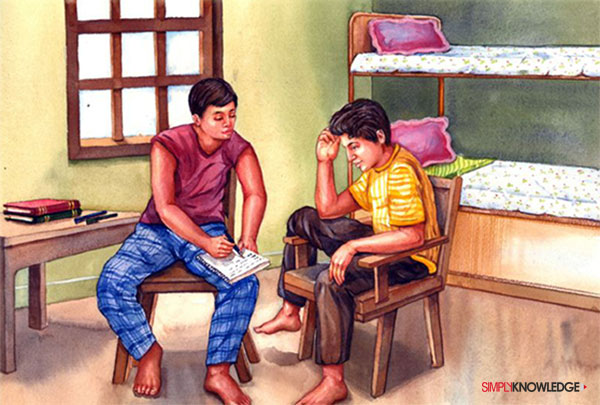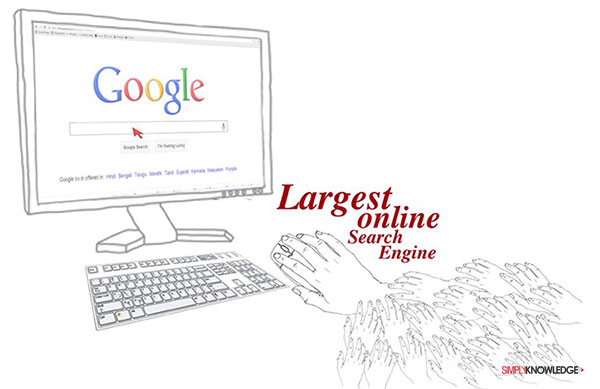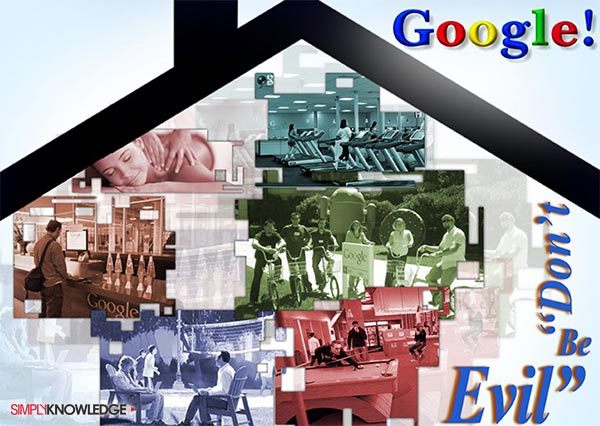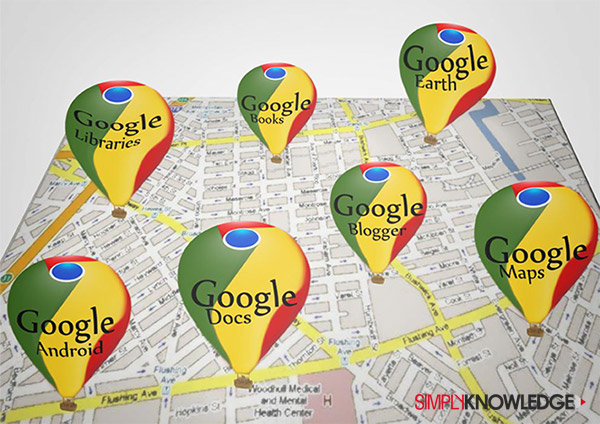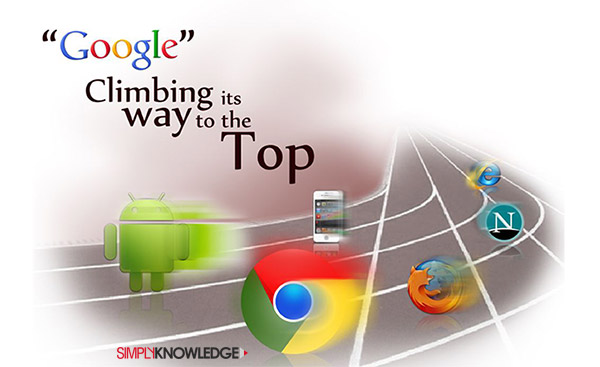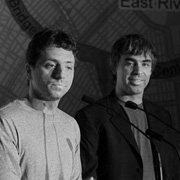



Introduction
Millions of websites, billions of page links and thousand zeta bytes of information, all at the click of a button! Magic? Nopes… technology! We live in a fast-moving information age. In the late 90s, I was instantly hooked to the virtual world when internet cafés popped up in my neighbourhood. Games, chat rooms, e-mail, even my favourite pop diva was out there. However, the world of search engines was never a joy ride, as it sucked up precious hours just to find the right query. A hit and miss scenario just like blackjack. Most of the time, primitive search engines listed useless information or smut. Then came my aha! moment when I landed on www.google.com. It was my gateway to the infinite universe of knowledge and the internet was never the same again. Since then the company and the website have come a long way.
Today we heavily [read blindly] rely on Google for searching information, right from acne to math queries. You even stealthy search your ex lover or crush on Google. Digital maps on it guide you with pinpoint accuracy when you are lost. It lets you correspond when you are on the move. Its cell phone operating system acts like a Swiss army knife featuring thousands of useful apps. Google has become a household name over the years as it is easy, simple and fast…. very, very fast. Roughly, within a single second, the Google servers provide you the relevant information available on the internet. Research had never been so easy [fun]. Google touches our life in so many ways. But then, the thought worth pondering over is Why it kept Bill Gates up all night? Why it earned the wrath of Steve Jobs? And what makes it so special?
Well, you don’t have to navigate to another page to know that. Simply scroll down without worrying about spam or pop ups.
Google is the brainchild of two Stanford geeks who virtually indexed the entire knowledge the world has to offer. Larry Page and Sergey Brin, the founders of the company and they know a hell of a lot about you thanks to your search habits. Let us peep into their life and in case, you are wondering if we are in a stealth mode? The answer is na, nay, no, not yet!
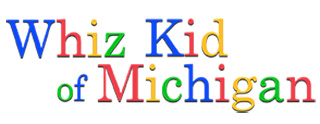
Whiz kid of michigan
One of the Google founders and inventors, Larry Page was born as Lawrence Page on 26th March, 1973, in East Lansing, Michigan, USA. His father, Carl Page, was the first in his family to earn a college degree and pursued PhD in computer science in 1965. I would like to remind you that back then computers were still in the nascent stages. Carl’s diligence made him a pioneer of second generation of computer science and artificial intelligence. Larry’s mother, Gloria, was a computer science professor at Michigan State University. Gloria was a Jew but she never forced her son to follow her religion. In 1975, a two year old Larry was enrolled in Okemos Montessori School. A straight ‘A’ student, Larry waltzed his way to East Lansing High School. At the age of six, this young genius was mesmerized when Carl brought home a personal computer. When the computer was plugged to switch-board, Larry was instantly fascinated by the virtual world.
The home itself was a gold mine of information on computers. The living room was a landfill of popular science magazines, books and hardware. Larry’s practical lessons on technology came from his elder brother Carl Jr. who taught him to take apart electronic appliances. Soon the boy-genius went on a rampage opening all the electronics around the house to see its circuitry working.
At the dinner table, the Page family talked only about computers and inventions. Larry was fed on technology and computers literally. Although shy by nature, yet, Larry was the coolest kid on the campus. He was the first student at school who did his assignments on Word Processor. Having both parents from a computer science background Larry very early on was inclined to computers. He desired to be an inventor and wanted to do something with computers. By the age of 12, Larry knew he would start his own company. Having graduated from high school in 1991, an 18 year old Larry enrolled in Michigan University in Bachelor of Science program with computers as his major. His professor, Elliot Soloway, saw Larry as a risk taker who did not bother about grades. The brainiac was passionate about technological inventions. Stickler that he was, Larry never gave up, and always completed what he started. An inventor at heart, Larry built his own inkjet printer out of Lego [kids building blocks] to print bigger pictures. The young boy genius did not stop there; he was an active member of Michigan University Solar Car team.

Genius in oppression
Now let us head to our time machine and punch August 21, 1973, Destination: Moscow, USSR. Sergey Brin was born to Michael Brin and Eugenia Brin. This educated and hard working Jewish couple faced the ire of Anti-Semitism on every step of their life. Michael was a talented student who aspired to be an astronomer. However, as he reached college, his dreams were crushed as Communist heads of the university barred Jewish students from the Physics department. While giving entrance exam of Moscow University, Michael was asked to sit with Jews in a different classroom. Beating the odds, Michael enrolled in the University and completed B.S. with major in Mathematics. After graduating from Moscow University, this bright Jewish mathematician struggled to survive in a country of hammer and sickle. The 1977 Warsaw Mathematical Conference was a revelation to Michael Brin. He marveled at the fact of enormous respect and freedom the mathematicians garnered outside the Soviet Union. He returned to Moscow with a decision in mind. He no longer wanted to live behind the iron curtain. Eugenia was skeptical about her husband’s move but for the sake of Sergey, the decision had to be made. The family applied for an exit visa in 1978; as a result, Michael responsively was fired from his teaching job. Eugenia too left her job due to enforcing circumstances. Without proper job, the couple struggled to meet their basic needs. They were worried if their visas were denied then survival in this godless nation would be impossible. All this while Michael taught himself computer programming. In May of 1979, Soviet government granted exit visa to the Brin family.
Michael Brin and his family moved to America to start their new life. Michael took a job at Maryland University as a professor of Mathematics. Eugenia served as a researcher at NASA’s Goddard Space Flight Center. The memory of oppression still fresh in his mind, Michael instilled a sense of purpose in young Sergey. He wanted Sergey to always come first, as second place was considered worse than losing. From the very beginning, competitiveness became a core part of Sergey’s personality. At the age of 6, he was enrolled in Paint Branch Montessori School in Adelphi, Maryland. Later, he was home schooled by his father who taught him Mathematics, Computers and Russian language.
In 1990, Sergey aged 16, was enrolled in University of Maryland to study Computer Science and Mathematics. During the same year, Michael organized a two-week student’s exchange program to Soviet Russia; Sergey was part of the team. During his visit, the young genius witnessed the repugnance of communism. He thanked his father for taking them away to America. Three years later, Sergey Brin received the Bachelors of Science with honours. Through National Science Foundation, Sergey received a Computer Science graduate fellowship at Stanford University. He was the youngest student in the university to pursue PhD.

The Obnoxious Roommates
Sergey had already completed 2 years at Stanford pursuing M.S in Computer Science and looked forward to complete his PhD. When Larry Page enrolled in 1995 as a PhD candidate at Stanford, Sergey volunteered as his campus guide during the orientation program. Both geniuses instantaneously sized each other up. Larry carried an air of being this super inventive genius while Sergey thought of himself as a master mathematician. They saw each other as arrogant, strong willed overachievers, a typical trait of super geeks. Larry was shy and would look at the floor when he spoke; on the other hand, Sergey was a classic extrovert. Sergey known for his high-handed attitude loved outdoor sports and was more of an outgoing personality. He was very curt and always ready with quick answers. Larry was shy and sported an invisible “nice-guy-tag” around him. However, one thing they both had in common was the passion for computer science.
Larry for his PhD dissertation theme undertook research and counting of the back links on World Wide Web. The idea came in middle of the night when Larry woke up from his slumber. He quickly noted down the idea and barged into Prof. Terry Winograd’s cabin next day to discuss his project. Larry thought he could download the entire web in one week… he couldn’t be more wrong. It was a gigantic task, yet Winograd encouraged the lad pursue his idea. It was purely a coincidence that Sergey too was interested in data mining project. He wanted to copy the entire World Wide Web and make some sense of it. When Sergey heard Larry’s dissertation theme he came forward to collaborate. These two geniuses were bound to meet as both thought outside the box and were always ready for challenges. Together they moved in a cramped dormitory room and started the project. Larry wrote a code that would find back links and nature of it. He named the project BackRub.

Project: Backrub
When project BackRub commenced Larry’s idea was simply to download all the links on the internet. It is estimated that back in 1996 there were 10 million web pages and unknown back links. Larry had to track each link between them. Together, Larry and Sergey downloaded each and every link out in the virtual world and wrote down codes for internet spiders which crawled across the World Wide Web. It still was a daunting task and highly unorganized. Larry developed PageRank, an algorithm that counted the popularity of a website based on the number of back links. This secret ingredient is what made Google that it is today. They had created a search engine, which was better than the existing one i.e. Yahoo! and Excite.
The BackRub was christened Googol, which in mathematical terminology means one followed by hundred zeros. It was Sergey Brin who suggested Google, which sounded friendlier. The new version of the website was modified and Sergey designed the user interface. The minimalism of the webpage enhanced the user experience and speed. Hector Garcia Molina, Professor of Computer Science and Electrical Engineering saw the first prototype of Google and was highly impressed. The updated program now analyzed the relevance of web page with back links that connected each other. In August 1996, the initial version of Google was hosted live from Stanford computer lab to process and download back links. The back links were indexed and streamlined whenever a user typed a particular query. Within hours, the entire Stanford network came down crashing as Google search engine garnered enormous traffic. The college administration asked the boys to pull down their website and host it elsewhere. The prototype of Google is still live on Stanford page. As Larry & Sergey were running short of money, they brought cheap hard drives and computer peripherals and created their own server. The server of Google was than neatly placed inside a cabinet built from Legos. In 1997, Google.com domain was registered.
The silicon valley
Stanford staff was amazed by the invention of this search engine when the genius duo submitted their paper ‘The Anatomy of a Large-Scale Hypertextual Web Search Engine’. The geeks had created a revolutionary technology; the underlying question was whether to seek out a buyer for it or simply let it collect dust at Stanford? After giving it a thought, they decided to drop their PhD program and set up their shop in 1998. However, funding for the company was not easy. They moved into their friend’s garage and set up their system. Sergey posted a printout on garage door reading Google Worldwide Headquarters. Larry Page became the CEO and Sergey Brin the President of the company. Back in the 90’s the tech inventors built something and usually sold it to industry giants like Microsoft or IBM. Stanford Prof. Winograd advised for the same but getting a buyer in Silicon Valley wasn’t easy. No one wanted to buy another search engine, and besides, you could not make money of it. Companies like Yahoo! Excite, Ask.com, AltaVista and WebCrawler already were the key players in search engine market. However, Google technology was brutally efficient than its rivals.

Firewall
The Venture Capitalist, Tech Guru and one of the co–founders of Sun Microsystems, Vinod Khosla met Larry and Sergey and reviewed their technology. He instantly liked the budding inventors and their promising software. He wanted to help these young boys and therefore, introduced them to Excite. Khosla held a decent share in the company and believed Excite could profit from Google technology and get an edge over its archrival Yahoo!
The meeting was held at a plush sushi restaurant. Excite’s co-founder and chief technologist, Graham Spencer was highly intrigued by the results of Google search engine. Larry Page and Sergey Brin were looking somewhere around $1 million to sell of Google. Spencer went back to his CEO along with Khosla to decide over the price of acquiring or licensing Google’s program. Blending Google software with Excite technology would have leapfrogged the company over Yahoo or any other tech giant in the industry but surprisingly, the myopic company decided to pass this golden opportunity. No one could see the potential of Google and the brutally efficient search engine had no takers in the Silicon Valley. Both Yahoo! & Excite believed their own technology was sufficient and rapidly evolving. They did not want to buy a product which had no scope of generating revenues. True! no one in the industry back in 1997 knew to make profit out of search engine.
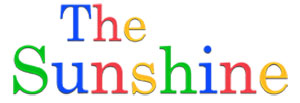
The sunshine
Disappointed by the cold snub at the hands of tech giants, the Stanford dropouts decided to run their own business. The go-getters met Prof. David R. Cheriton who taught Computer Science and Electrical Engineering at Stanford. Also, a venture capitalist of small tech firm, Cheriton introduced them to Andy Bechtolsheim, co-founder of Sun Microsystems. Andy drove in his Porsche on a Sunday morning to the office of Google based in a suburban garage. After a quick demo, Andy asked Larry and Sergey not to undervalue their technology or worry about the money. He walked up to his car, pulled out a chequebook and drew a cheque of $100,000. He turned and said “in whose name shall I draw the cheque?” Reply came “Google Inc”. Unfortunately, the duo couldn’t deposit the cheque as they neither had a bank account nor was their company officially incorporated.
To run a successful software company more seed capital was required. They turned to angel investor Ram Shriram who was skeptical about a new search engine in a cluttered market. Taking a leap of faith, the angel investor along with other venture capitalist like Jeff Bezos [Amazon.com] and others, arranged a $1 million capital for the company. For the next two weeks Page and Brin engaged in surmounting paper work and incorporated Google on September 4, 1998. The company now Moved to Mello Park and hired their first employee Craig Silverstein, a fellow Stanford student. The young boys would often joke that they would be billionaires someday. The same year Google got listed in top 100 websites in PC magazine.
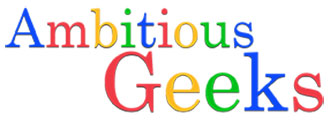
Ambitious geeks
Google had received a smooth launch but to soar higher Larry and Sergey knew they wanted rocket propulsion. Their next step was to acquire bigger capital and that is where KCPB and Sequoia Venture stepped in. When Larry and Sergey met John Doerr of KCPB Venture Capital he got really excited about Google technology. The successful venture capitalist known for his Midas touch had raised money for companies like SUN, Compact, Netscape and Amazon. However, Doerr was skeptical about 20 something nerds running the company with no prior experience in the industry. Nevertheless, Larry impressed Doerr by predicting that the company had the potential to reach $10 mark. Doerr was intrigued and asked “in terms of company value?” Larry in a serious tone replied, “No $10 billion in revenue”. Michael Moritz of Sequoia Capital, also a successful capitalist of Yahoo, showed interest in funding the company.
In June 1999, John Doerr and Michael Moritz raised $25 million for the company. With so much money in its kitty, Google now hired the best minds in Silicon Valley. A handful of brightest PhD and Engineering students were chosen from Google Labs Aptitude test. Until this day, a high standard of selection is maintained by the company. Every year thousands of engineers from Carnegie, MIT, Stanford and across the globe apply at Google out of which only a selected few are recruited. Back in 1999, to hire and promote the website, billboards across America displayed Google.com in a form of mathematical equation. It not only created curiosity but also led thousands of brainiest individuals to send feedback to the company. Google incorporated graduate school environment in the company’s ‘Googleplex’ campus. The company provides its employees' best salaries along with mouth-watering perks literally.
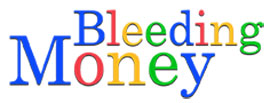
Bleeding money
Larry and Sergey tied up with fastest internet browser Netscape and AOL to bring traffic to their website. In 1999, Google was recognized as a game changer when it was awarded with Technical Excellence Award for innovation in web application development. The search engine through word of mouth became an instant hit with web users. Even the giants took a notice of this 40-employee startup. The website was growing and reported 100,000 queries every single day. However, in Silicon Valley eyeballs come first and money comes later. Google was bleeding its cash register. Nearly half million was flying out in the form of salary and hardware procurement. The founders had no idea how to generate revenue for the company. Advertising was their only solution. Pop up ads, tickers and other distracting features appeared on Yahoo! & Excite and generated millions of dollars in revenue. Larry and Sergey both could not stomach the idea of flashy annoying ads on their website. Nevertheless, there was no other source to generate revenue.
Their solution came from a company based outside the Silicon Valley - Idealabs. Bill Gross, the founder of Idealabs had created a website Overture which would show the sponsored ads when the user punched in keywords. Idealabs had made huge profits out of its technology. All this while, Larry and Sergey kept close vigil on Overture. In the coming months, Google showed keen interest in acquiring the software. They desired to blend Overture’s monetary features with Google’s efficient technology. Many rounds of behind the door meetings took place but nothing conclusive happened.

Good Artists Copy, Great Artists Steal
Taking inspiration from Idealabs,Google created its own revenue-generating product Google Adwords in 2000. A paid system for advertiser and marketer where one can bid for key words and sprinkle them in their website content. When a user types in a query, the software recognizes the key words and displays ads next to the findings under sponsored links section. It was an ingenious solution without sacrificing user experience and speed. Google Adwords was a win-win situation for the company and advertisers as they paid for per clicks. The venture capitalists took a sigh of relief seeing Google cash registers ring. Bill Gross sued Google for poaching his technology without paying the royalty. It was a PR nightmare for a young company like Google. The dispute was settled out of the court for an undisclosed amount and decent volume of company shares.
During the same year Google became the largest online search engine with over billion URL in its index. The company’s earnings skyrocketed. Many experts believed that such business model which depended more than 95% on advertising revenue was doomed to failure. The company had to come up with different products to deepen its pockets.
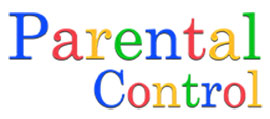
Parental Control
The young company was doing great but to ensure smooth operations and meet targets, a corporate leader was imperative. Larry and Sergey interviewed many prospective CEO’s of Silicon Valley but no one matched the Google culture. Google’s venture capitalist John Doerr introduced the duo to Silicon Valley’s legendary CEO Eric Schmidt. Schmidt was an engineer at heart and businessman from head. With more than 30 years of experience under his belt, the hotshot CEO had turned fortunes for many tech companies.
In 2001, Eric Schmidt was roped in as the Chairman, CEO of young Google Inc. Larry Page became the president of products while Sergey Brin became the president of technology. The partners still shared the same cabin and backed each other up. Schmidt’s experience came handy as it gave Google a right direction. The company became profitable and organized replacing existing search engine on the internet. More than 3 billion webpage’s were linked to Google now. It also replaced Overture when Google tied up with AOL as their featured search engine. This brought 34 million new users to Google page in 2002.
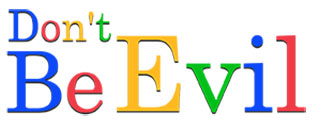
Don’t be evil
Google’s work culture is different from the rest of corporate America. The developers are free to come as per their convenience. Sergey believed that most of his brightest ideas came when he opened his refrigerator. Hence, more than 300 chefs provide Google employees free food and drinks every day. There are private massage centers, gym and sand volleyball court on the campus. Employees ride in around the campus on Segways and electric scooters. Video games and pool tables are scattered across the campus of Googleplex in California. According to the recent survey, Google employees are happiest in the world. The company’s motto ‘Don’t Be Evil’ reflects prominently in its HR policy.
To ensure that Google’s brightest minds don’t leave the company the founders initiated a program “20% Time”. This meant that an employee could work on his personal idea by dividing his office hours in 80-20 schedule. Orkut and Google News came out of this program. However, Larry and Sergey never entertain products or ideas that are slow to execute. Ever since roping in Eric Schmidt, the founders have taken on their share of work at the company. The masterminds have successfully acquired latest web sensation and launched many Google products.

Hitting the Wall Street
"We need to move on to doing a million miles ... The level of reliability we need for a real consumer product is high, and we're getting there. I'm really optimistic."
In 2004, Google was growing rapidly and it no longer was feasible to remain a private entity. Time had come to go public. The IPO of Google was much talked about on the Wall Street. But the company’s code of ethics and policy were drastically different from the companies listed on Nasdaq. It stated in its IPO profile that the company was not the conventional type and worked for the betterment of the humanity. In addition, they challenged the Wall Street by deciding their IPO price through auction. This attitude somehow did not go down well with the investors. It received a cold response when the market opened on August 19, 2004. Its share price was just above 100$ when the trading ended that day. Many Wall Street experts believed they could have raised more money with their existing shares i.e. 19,605,052. The same year Google received the Marconi Foundation Prize for its innovation. It highlighted the dominance of Google in IT world. With company’s kitty full with cash and profits rising quarterly, Larry and Sergey went on a corporate shopping spree.
In 2005, Google quietly acquired Android and prepared itself to enter mobile arena, which so far was dominated by Nokia. At the home front, Larry and Sergey channelized their ingenuity to churn out internet products used on a daily basis. Gmail was one such product, which Google launched and found a roadblock. Moreover, it spooked its users when advertisements related to their personal message crept up on the screen. It alarmed the users and Google faced the wrath of many internet policy makers for company’s poor privacy ethics. Even company’s Google Video was infamous for its frustratingly slow upload speed. In 2006, Google purchased YouTube for $1.65 billion. Today, the site gets more than 2 billion hits every day. By acquiring popular technologies and companies, Google, in 2007, became bigger than McDonalds, Coke, FedEx, Intel, IBM and Wal-Mart. It became the fastest growing company ever since the dot com bubble burst in 2000. A single share of Google was worth $700 and its biggest investors made millions. According to Wall Street report, Google made more than 1000 millionaires ever since it went public. The company not only made its investors rich but also gave stock options to its employees. With 16% of ownership in the company, the dynamic duo became the new billionaires on the block.
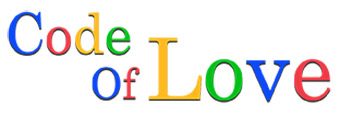
Code of love
In 2006, Larry began dating Marissa Mayer, then head of location product of Google. Unfortunately, things did not work out between them and they went their individual ways. Soon after the break-up, Larry met Lucinda Southworth, a research scientist and sister of actor Carrie Southwest. After dating for one year, the madly in love couple tied the knot at Necker Island in 2007. Richard Branson was the groom’s best man. The same year Sergey too got married to a Anne Wojcicki. The guests boarded the private jet and landed on the island of the Bahamas where the couple got united in holy matrimony. Sergey who all his life had lived very modestly now bought himself a swanky house in Greenwich Village, New York. Larry too moved into his sprawling mansion costing millions of dollars. Boys will be boys; they bought everything a boy dreams to buy when he becomes a billionaire. Larry owns a private luxury yacht worth $45 Million. Sergey soothed his raging testosterone by acquiring German Dornier Alpha fighter Jet.
Avid supporters of nature and clean fuel, both Larry and Sergey have invested in Tesla Motor, the manufacture of hybrid sports cars and motorbikes. The automobiles run on clean bio-fuel and electric cells. Google.org a philanthropic arm of the company invests heavily in renewable energy research. In 2008, Sergey’s mother, Eugenia was diagnosed with Parkinson disease. Sergey underwent a thorough check up and discovered he too carried a faulty gene that may lead to Parkinson. Loosing no heart, Sergey Brin donated millions of dollars for the research of Parkinson.

Playing with Big Boys
Never resting on its laurels the Stanford geeks introduced Google Libraries, Google Books, Google Earth, Maps, Blogger, Android and Google Docs. All this gave many sleepless nights to Bill Gates. But the oldest bully of Silicon Valley didn’t go down on its knees. Microsoft launched ‘Bing’ search engine, which worked as fast and efficiently as Google. According to Microsoft, they did a favour to Google by keeping them away from lawsuits for creating monopoly in the industry. Not only the tech giants, but even US courts ordered Google to hand over a copy of its database for its propaganda. The biggest threat came from outside when in 2006 Google entered China, the biggest market in Asia. It gave access to 1 billion customers but under a strong censorship. Sergey was always skeptical to enter Chinese market due to country’s communist ideology. His worst nightmare came true within a few months. Google discovered cyber attacks on its servers. Gmail accounts of few Chinese human rights activists were hacked. Without further delay, Google pulled out plugs in China and redirected its users to the uncensored Hong Kong site. After tense negotiations, Google license was renewed in 2010.
In 2007, Apple entered the mobile market with iPhone featuring its operating system. It was a revolutionary product which changed the mobile handset industry forever. iPhone was the smartest handset on the planet but it came at a steep price. Google launched its Android operating system which could be licensed by any handset developers. Steve Jobs was furious and slammed Google for its cheap OS that threatened the superior iPhone. Eric Schmidt during this period was on Apple’s board and he resigned from his position. War ensued for next three years and by May 2010 Android outsold iPhone with a 250,000 Android activation per day. Sergey and Larry launched their own browser, Chrome, in 2009 challenging Microsoft’s Internet Explorer, which was facing some tough competition from Netscape and Firefox.
The minimalist Chrome was faster and efficient than its rivals. In the coming years, Larry and Sergey were looked as the new bullies on the block. Google embroiled in a worldwide controversy when it scanned all the books on earth without permission from authors and publishing houses. Google Street too earned dissension from authorities, as it appeared to be a major threat for public security and privacy. Many conspiracy theorists believe that Google is dangerously becoming too powerful every second.

End note
"We want Google to be the third half of your brain."
In 2011 Larry Page replaced Eric Schmidt as the CEO of the company. The Google vs. Apple & Microsoft war is still on. But this competition has led to many innovations and above all the end users have benefitted the most. Google now faces some bigger challenges and it comes from Facebook. 500 million internet users spend more time on Facebook than Google. Mark Zuckerberg now knows more about you than anyone else. Ever since the launch of Facebook, Google has been trying to catch up with its Google+ but so far hasn’t quite left an impression. In 2013, Larry paralyzed his left vocal cord after he suffered mild cold in summer. He has donated more than $20 million for research to Voice Health Institute in Boston. Today, Google’s stock market value is over $200 billion with jaw dropping products like Google Moon and Google TV and this is just the tip of the iceberg.
While writing this article, a revolutionary technology was launched by Google – ‘search by voice’. Guys this is where science fiction comes to reality. Being a victim of Google’s April fool jokes in the past, I was skeptical initially. However, this thing works… period! You don’t have to be Bruce Wayne or Tony Stark to own voice recognition search engine. Google’s innovation is just a tiny step in the future. There are many more things in the store for web users, as Larry and Sergey continue creating and innovating jaw dropping tools.
"Some say Google is God. Others say Google is Satan. But if they think Google is too powerful, remember that with search engines unlike other companies, all it takes is a single click to go to another search engine."
Biography of Google Boys | 0 Comments >>
0 --Comments
Leave Comment.
Your email address will not be published. Required fields are marked.
